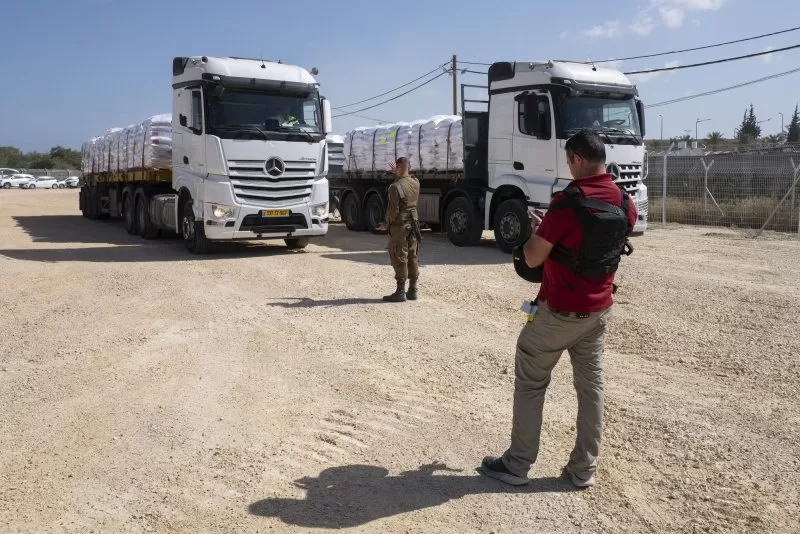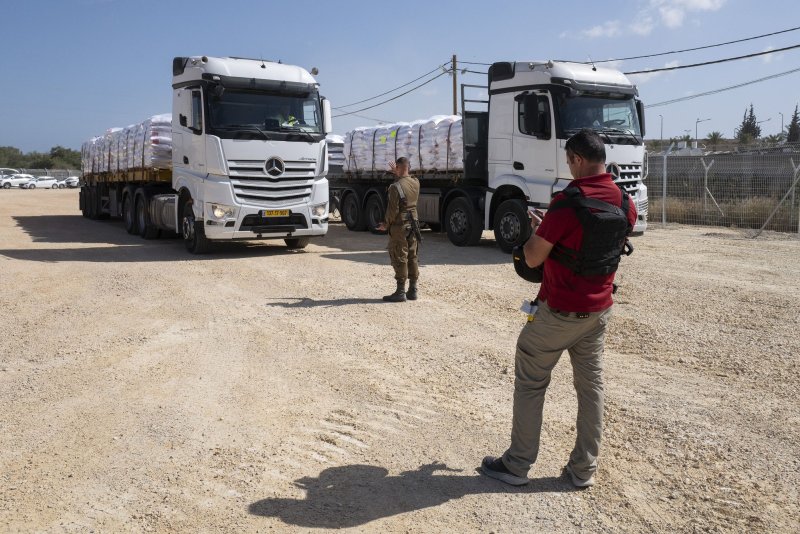1 of 3 | An Israeli soldier (L) and a security guard keep track of trucks of humanitarian aid arriving from the Ashdod port to the Erez Crossing checkpoint before entering to the northern Gaza Strip on Sunday. Photo by Jim Hollander/UPI |
License PhotoMay 5 (UPI) — Nearly 35,000 Palestinians have been killed by Israeli forces since October 7, the Gaza Health Ministry said Sunday, as Palestinians face dueling famine and sanitation crises because of Israel’s actions amid the war.
“As thousands of tons of waste pile up across the Gaza Strip, concerns over hygiene and sanitation are increasing,” the United Nations Agency for Palestine Refugees said in a statement Sunday.
“With critical machinery damaged and access to landfills repeatedly denied, UNRWA sanitation teams do all they can to avert diseases spreading — but we need more access.”
The agency said that as much as 40,000 tons of waste has piled up in the city of Jabalia in northern Gaza alone with accompanying video footage that makes the community look like a landfill.
“As we move into summer, concerns over hygiene and sanitation are increasing,” the UNRWA said. “Mosquitos, flies, mice and rats are spreading – and so are diseases.”
Medecins Sans Frontiers, the aid organization known in English as Doctors Without Borders, similarly noted last week that Israel has been an obstacle to providing aid to wounded civilians by blocking, delaying and restricting essential supplies.
For example, an oxygen concentrator — used to treat the likes of malnourished children, people with severe blood loss and newborns with breathing difficulties — has not been allowed into any hospitals in Gaza.
“Israeli authorities are maintaining full control over the entry and exit points into Gaza, they have repeatedly refused MSF’s requests to bring biomedical equipment such as an oxygen concentrator,” Doctors Without Borders said. “When a request has been approved, interminable inspection processes at the border have had the same result.”
The aid organization wrote an analysis of the “opaque” inspections and the full process for how materials enter Gaza from Egypt’s Al-Arish airport, arguing that there is no clarity or consistency to what is allowed into the Palestinian territory.
“Before the current war, an estimated 500 truckloads of supplies entered Gaza every day,” Doctors Without Borders said, noting that air drops and sea corridors are not a sufficient substitute to land routes. “By February 2024, this had reportedly dropped to below 100 truckloads per day.”
Meanwhile, the World Food Program has called the catastrophic famine in Gaza a “dark mark” on the world while similarly blasting Israel.
“Children crying out from hunger and dying of malnutrition. People risking gunfire to reach aid convoys, and surviving on animal fodder and soup made from leaves and grass,” the organization said in a statement. “Levels of hopelessness and food insecurity that could turn a humanitarian catastrophe into something much worse.”
The World Food Program said that an estimated 300,000 people in northern Gaza alone are facing catastrophic famine in the coming weeks. About 1.1 million Palestinians in Gaza are experiencing catastrophic hunger.
“It’s frustrating. We need a tsunami of aid, not a trickle,” Matthew Hollingworth, an executive in the aid organization, said. “But at this point any effort to bring in more assistance is welcome. Because the level of need is so great, we need approvals to provide massive and nonstop deliveries.”
And the West Bank is also feeling fallout from war with many going hungry in the Palestinian territory, Hollingworth said.
“Laughter is not something you hear in Gaza these days,” he said. “You hear shellfire and mortar fire, rocket fire and small arms fire. You hear people crying. You see them crying.”

